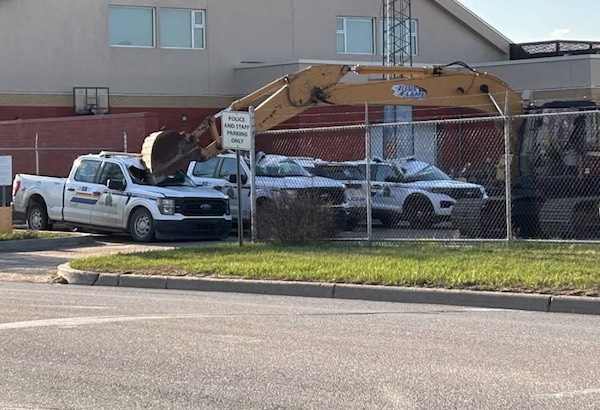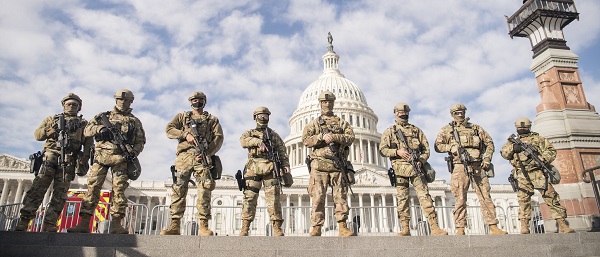Alberta
Bonnyville RCMP targeted by suspect driving a trackhoe – Update

From Bonnyville RCMP
On May 3, 2025, at approximately 6:55 p.m., a male suspect drove a stolen trackhoe into the parking lot of the Bonnyville RCMP detachment. Investigation has revealed that just prior to this occurring at the detachment, the suspect stole the trachoe from a local business. In the process of stealing the trackhoe, the suspect drove through a fence of the business, causing significant damage.
The suspect then headed to the detachment, picking up boulders along the way. He then dumped several boulders in front of the prisoner bay of the detachment, believed to be an attempt to delay officer’s ability to respond to calls. He then drove the trackhoe into 5 unoccupied parked police vehicles, making them inoperable. The suspect then fled from the detachment on foot.
Thanks to assistance from the RCMP RTOC (Real Time Operations Center), numerous resources were called in to assist, including St. Paul Police Dog Services (Chase), Cold Lake RPAS (drone), Eastern Alberta District General Investigation Section and Crime Reduction Unit and Elk Point Detachment. The real-time operations center is based out of K Division headquarters and is comprised of RCMP officers who are able to oversee and quarterback high risk incidents, such as this as they unfold. Their involvement in these types of incidents not only increase our chances of catching a fleeing suspect, but officer safety also increases. They are truly an invaluable resource.
Containment was set up and the search began for the suspect. A short time later, PDS Chase located the suspect hiding in a tree line just north west of the detachment. During his arrest, the suspect resisted and fought officers, and as a result, he was bitten by PDS Chase. Once in custody, he was taken to a local hospital to get treated for minor injuries and was released.

David Merko (62), a resident of Bonnyville, has been charged with 13 criminal code offences:
- Dangerous driving
- Mischief over $5000 (x6)
- Break and enter
- PSP over $5000
- Theft over $5000
- Obstruct/resist peace officer (x2)
- Utter threats
The last charge of uttering threats was as a result of an April 17th incident in which David Merko called OCC (dispatch) in Saskatchewan and uttered threats to kill RCMP officers.
After a Judicial Interim Release Hearing, Merko was remanded into custody for Alberta Court of Justice in Bonnyville on May 6, 2025.
Detachment Commander Staff Sgt. Sarah Parke states, “Incidents like this can be frightening for communities. In this instance, we believe there was no threat to the public and the RCMP was the target. Alberta RCMP officers from neighbouring detachments did not hesitate to assist to ensure the suspect was quickly taken into custody, as well as assisting with ensuring on-going police service in Bonnyville.
This incident has garnered a lot of attention on social media, and unfortunately, many of the comments are negative, some of which are threatening towards RCMP to the point of expressing disappointment that officers were not injured or killed during the incident. All RCMP officers come to work, day in and day out, to protect and serve their community. It is extremely disheartening to see these types of comments made.
Alberta RCMP have seen a steady increase in violence towards police in recent years. Most recent statistics indicate that on average, there are 2.3 incidents of violence occurring every day towards Alberta RCMP officers. In 2023, 70 Alberta officers were injured as a result of use of force incidents.
Thankfully, no one was injured during this incident.”
Alberta
IEA peak-oil reversal gives Alberta long-term leverage

This article supplied by Troy Media.
The peak-oil narrative has collapsed, and the IEA’s U-turn marks a major strategic win for Alberta
After years of confidently predicting that global oil demand was on the verge of collapsing, the International Energy Agency (IEA) has now reversed course—a stunning retreat that shatters the peak-oil narrative and rewrites the outlook for oil-producing regions such as Alberta.
For years, analysts warned that an oil glut was coming. Suddenly, the tide has turned. The Paris-based IEA, the world’s most influential energy forecasting body, is stepping back from its long-held view that peak oil demand is just around the corner.
The IEA reversal is a strategic boost for Alberta and a political complication for Ottawa, which now has to reconcile its climate commitments with a global outlook that no longer supports a rapid decline in fossil fuel use or the doomsday narrative Ottawa has relied on to advance its climate agenda.
Alberta’s economy remains tied to long-term global demand for reliable, conventional energy. The province produces roughly 80 per cent of Canada’s oil and depends on resource revenues to fund a significant share of its provincial budget. The sector also plays a central role in the national economy, supporting hundreds of thousands of jobs and contributing close to 10 per cent of Canada’s GDP when related industries are included.
That reality stands in sharp contrast to Ottawa. Prime Minister Mark Carney has long championed net-zero timelines, ESG frameworks and tighter climate policy, and has repeatedly signalled that expanding long-term oil production is not part of his economic vision. The new IEA outlook bolsters Alberta’s position far more than it aligns with his government’s preferred direction.
Globally, the shift is even clearer. The IEA’s latest World Energy Outlook, released on Nov. 12, makes the reversal unmistakable. Under existing policies and regulations, global demand for oil and natural gas will continue to rise well past this decade and could keep climbing until 2050. Demand reaches 105 million barrels per day in 2035 and 113 million barrels per day in 2050, up from 100 million barrels per day last year, a direct contradiction of years of claims that the world was on the cusp of phasing out fossil fuels.
A key factor is the slowing pace of electric vehicle adoption, driven by weakening policy support outside China and Europe. The IEA now expects the share of electric vehicles in global car sales to plateau after 2035. In many countries, subsidies are being reduced, purchase incentives are ending and charging-infrastructure goals are slipping. Without coercive policy intervention, electric vehicle adoption will not accelerate fast enough to meaningfully cut oil demand.
The IEA’s own outlook now shows it wasn’t merely off in its forecasts; it repeatedly projected that oil demand was in rapid decline, despite evidence to the contrary. Just last year, IEA executive director Fatih Birol told the Financial Times that we were witnessing “the beginning of the end of the fossil fuel era.” The new outlook directly contradicts that claim.
The political landscape also matters. U.S. President Donald Trump’s return to the White House shifted global expectations. The United States withdrew from the Paris Agreement, reversed Biden-era climate measures and embraced an expansion of domestic oil and gas production. As the world’s largest economy and the IEA’s largest contributor, the U.S. carries significant weight, and other countries, including Canada and the United Kingdom, have taken steps to shore up energy security by keeping existing fossil-fuel capacity online while navigating their longer-term transition plans.
The IEA also warns that the world is likely to miss its goal of limiting temperature increases to 1.5 °C over pre-industrial levels. During the Biden years, the IAE maintained that reaching net-zero by mid-century required ending investment in new oil, gas and coal projects. That stance has now faded. Its updated position concedes that demand will not fall quickly enough to meet those targets.
Investment banks are also adjusting. A Bloomberg report citing Goldman Sachs analysts projects global oil demand could rise to 113 million barrels per day by 2040, compared with 103.5 million barrels per day in 2024, Irina Slav wrote for Oilprice.com. Goldman cites slow progress on net-zero policies, infrastructure challenges for wind and solar and weaker electric vehicle adoption.
“We do not assume major breakthroughs in low-carbon technology,” Sachs’ analysts wrote. “Even for peaking road oil demand, we expect a long plateau after 2030.” That implies a stable, not shrinking, market for oil.
OPEC, long insisting that peak demand is nowhere in sight, feels vindicated. “We hope … we have passed the peak in the misguided notion of ‘peak oil’,” the organization said last Wednesday after the outlook’s release.
Oil is set to remain at the centre of global energy demand for years to come, and for Alberta, Canada’s energy capital, the IEA’s course correction offers renewed certainty in a world that had been prematurely writing off its future.
Toronto-based Rashid Husain Syed is a highly regarded analyst specializing in energy and politics, particularly in the Middle East. In addition to his contributions to local and international newspapers, Rashid frequently lends his expertise as a speaker at global conferences. Organizations such as the Department of Energy in Washington and the International Energy Agency in Paris have sought his insights on global energy matters.
Troy Media empowers Canadian community news outlets by providing independent, insightful analysis and commentary. Our mission is to support local media in helping Canadians stay informed and engaged by delivering reliable content that strengthens community connections and deepens understanding across the country.
Alberta
READ IT HERE – Canada-Alberta Memorandum of Understanding – From the Prime Minister’s Office

-

 Alberta7 hours ago
Alberta7 hours agoFrom Underdog to Top Broodmare
-

 armed forces2 days ago
armed forces2 days ago2025 Federal Budget: Veterans Are Bleeding for This Budget
-

 Alberta1 day ago
Alberta1 day agoAlberta and Ottawa ink landmark energy agreement
-

 Artificial Intelligence2 days ago
Artificial Intelligence2 days agoTrump’s New AI Focused ‘Manhattan Project’ Adds Pressure To Grid
-

 International1 day ago
International1 day agoAfghan Ex–CIA Partner Accused in D.C. National Guard Ambush
-

 Carbon Tax1 day ago
Carbon Tax1 day agoCanadian energy policies undermine a century of North American integration
-

 International1 day ago
International1 day agoIdentities of wounded Guardsmen, each newly sworn in
-

 International2 days ago
International2 days agoTrump Admin Pulls Plug On Afghan Immigration Following National Guard Shooting






